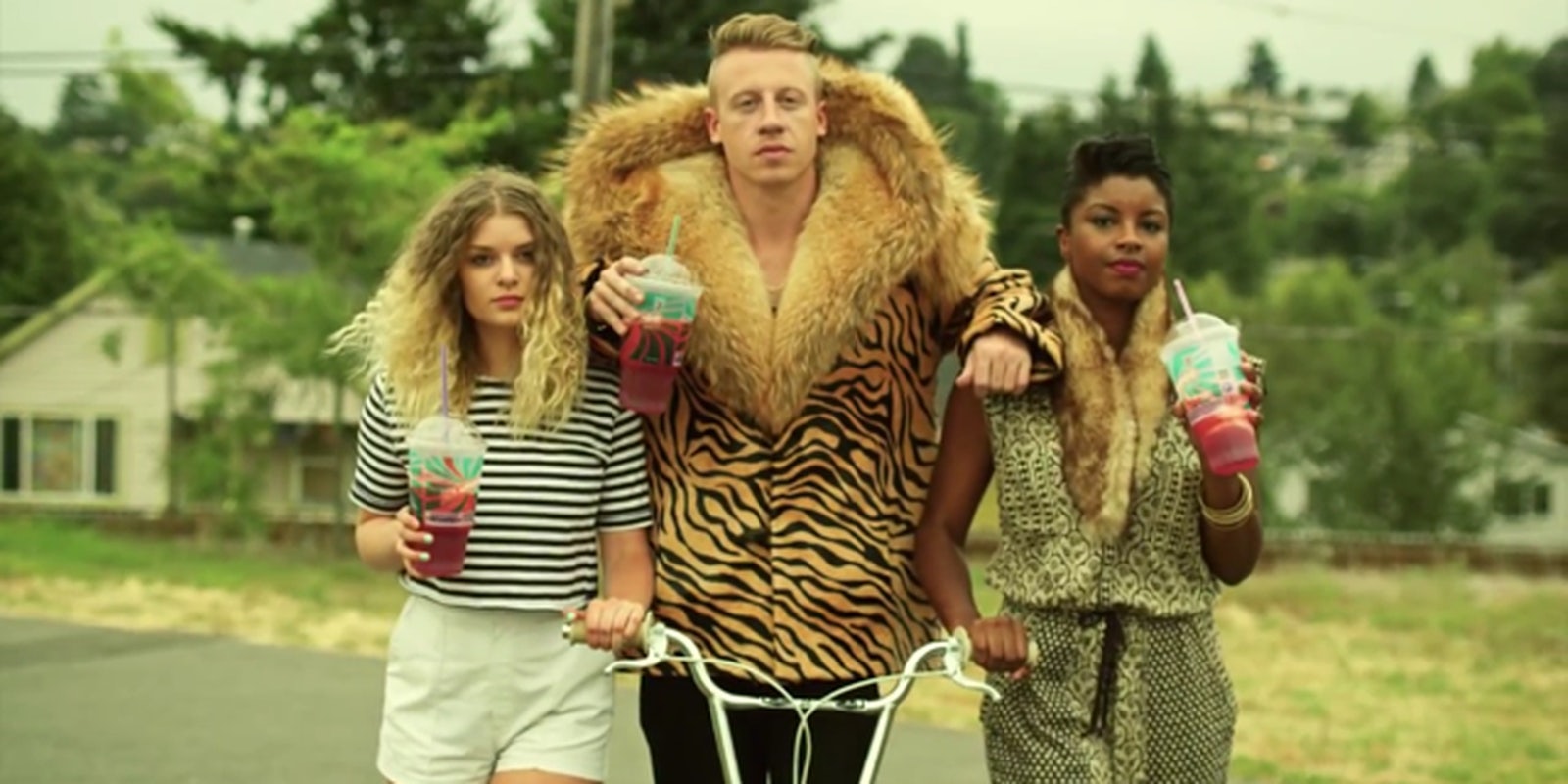It’s no real surprise that Macklemore and Ryan Lewis’s “Thrift Shop” was the most popular track of 2013 on Playlists.net’s top 100 list. It was inescapable this year, and even brought some people to their breaking point: Back in April, a woman attempted to strangle her boyfriend after he played the song repeatedly.
But this year music made people do strange things: Parody Miley Cyrus’s “Wrecking Ball” beyond context, expose every raw nerve over groups like One Direction. This was a year in which pop Xeroxed itself, from the borrowed soul of “Blurred Lines” to the borrowed ‘70s funk of “Get Lucky.” Then there were acts like Kanye West, whose Yeezus relied heavily on sampling, while also making some of the most drastic alterations to pop and rap.
Playlists.net, the mixtape-making left brain to Spotify’s quantifying right brain, recently released their stats for 2013. The remaining top nine tracks of the year include two by Swedish House Mafia, plus Skrillex, Daft Punk, Avicii, Calvin Harris, another Macklemore song, and will.i.am featuring Britney Spears. The top 20 is heavy on pop: MGMT, fun., Passion Pit. Gone from the top of many of these lists are women who also made alterations this year: Lorde, Lady Gaga, Janelle Monae, Miley Cyrus, Solange.
This might give you some idea of the Playlists.net demographic. Curiously, one playlist in particular has had an amazing run on the charts for two years now: Hipster International, curated by Napster founder Sean Parker. In fact, he takes this playlist very seriously.
“There weren’t any other real surprising trends other than we’ve had hundreds of ‘hipster’ playlists submitted, which I attribute to Sean Parker,” Playlists.net founder Kieron Donoghue adds.
Let us give thanks.
Another trend this year: Television and gaming soundtracks were popular. Donoghue says that’s because there’s been a more concerted effort towards curating music in those industries. This can be seen in Spotify’s recently released data from 2013, which shares many acts with Playlists.net’s lists: The number one most “viral” track is Badfinger’s “Baby Blue,” which was featured on the final episode of Breaking Bad. Icona Pop’s “I Love It” experienced a viral renaissance after a cameo on Girls.
“I think that music supervisors for both TV shows and video games have upped their game in 2013, hence we have people actively searching for the music that was played in TV shows and games,” Donoghue says. “I know that Rockstar Games especially have teams of people dedicated to discovering and licensing music for their games.”
The number one playlist in 2013 was the Weekly Top 100, released every Monday, which shows people are using the site as a means to keep up with trends. The top artist was Kanye West, another musician who made us do strange things this year, if only as a means to live out his fantasies with him. The rest of the top 10 is a fairly underwhelming mix of mid-Aughts arena pop, mixed with Jay Z and Michael Jackson, but the fact that David Bowie is at number nine seems promising.
But to find the real meat on Playlists.net, you’ve got to dig deep into the user selection. The top user of the year is Reggie Prim, who’s posted obscure, smart lists like this one.
“In terms of predictions for 2014, I think the playlist is definitely going to come of age as a format and traditional compilation albums will suffer because of this,” Donoghue says. “After all, a playlist of the top 500 songs ever doesn’t have the same limitations as a CD that can only store 70 minutes or so of music.”
But as our attention spans continue to shrink, is that for better or for worse? Will music continue to be made to fit those attention spans, to go viral, to market a product, to make us strangle each other? Or has the playlist format evolved as a necessity, to add a personalized touch to the way we share and experience music as a social act?
Screengrab via Ryan Lewis/YouTube


